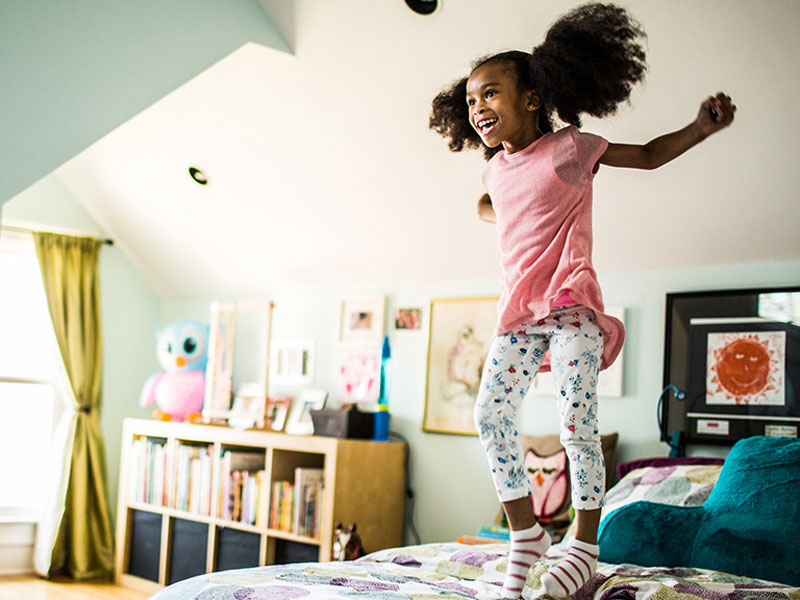For many kids, summer is a time to relish in the longer days by staying up later with friends or family.
Sanford Health‘s Dr. Arveity Setty, a pediatric sleep specialist, says the summer sleep schedule is usually a delayed sleep phase for most kids, since they go to bed later and wake up later.
In this pattern, they get “almost the same duration of sleep and sometimes a little more, usually not less,” he said. “So it does not usually affect them physiologically.”
When school starts, though, it can be difficult for some kids to change their sleep schedules. “They cannot easily fall asleep and cannot wake up on time, or might fall asleep in the classroom, affecting their education,” Dr. Setty said. “Kids who had a hard time adjusting their schedule a year before should make sure to keep their school sleep schedules.”
Here are a few tips to make sure your kids continue to get sound sleep throughout the summer and get back into a routine once school starts.
Know your sleep numbers
No matter the season, kids need a certain number of hours of sleep each night for better behavior, mental health, memory and a stronger immune system. School-age children need between nine and 12 hours a night, while teenagers need between eight and 10 hours.
Children who regularly miss out on enough sleep are prone to health problems such as depression, high blood pressure and obesity. They also have more behavioral issues, are more irritable and have trouble concentrating.
Try to stay consistent
“Consistency with sleep habits is the key to have good sleep habits and duration,” Dr. Setty said.
If you adjust your child’s bedtime in the summer, try to keep sleep and wake times consistent. For example, if your 12-year-old’s summer bedtime is 10 p.m. instead of 9 p.m., try not to stray too far from that time every night. A consistent sleep schedule is important for all kids as children who get enough sleep perform better in school and have better behavior and memory.
To help with consistency, keep the same bedtime routine during the summer, whatever that may be, such as brushing teeth and reading before bed.
Make a gradual shift at summer’s end
Don’t wait until the night before school starts to shift your children back to a regular sleep schedule. A week or two before school begins, get started.
The body’s circadian rhythm, or 24-hour sleep-wake cycle, is more dependent on wake-up time than bedtime, Dr. Setty said. So start by having kids wake up at the earlier school time. Then gradually shift their bedtime earlier as well.
“For the first few days, they will be sleep-deprived, but that’s all for good,” Dr. Setty said.
Using low-dose melatonin during this short period of time can help accelerate the process and help kids resume the schedule faster, he said.
Ideally, kids should be back on the preferred sleep schedule at least a few days before the first day of school.
Signs of sleep problems
If a child is getting a good duration of sleep but still wakes up tired or isn’t restored by sleep, that would be a concern warranting medical attention, Dr. Setty said. Symptoms of sleep apnea such as snoring, apnea or gasping would as well.
Other signs that might benefit from medical attention include a child who is restless in sleep, or having lot of nightmares or terrors, or frequently sleepwalking, or falling asleep easily in any situation but especially in the classroom, he added. Sleep is also considered in a workup for ADHD if parents feel their child is not getting a good sleep.
Encourage healthy sleep habits
Once your child is back at school, instill a few healthy habits to help him or her get enough sleep year-round:
- Keep all electronic devices out of children’s bedrooms, and stop all screen time at least an hour before bedtime. The blue light from screens can disrupt sleep by keeping kids, including teens, too alert.
- Make sure your child gets plenty of physical activity during the day.
- Keep the lights dim in your home toward bedtime.
- Cooler bedroom temperatures are more conducive to sleep.
Learn more
- Daylight saving time: These tips ease health effects
- Why your child needs plenty of z’s
- Back-to-school tips for a smooth transition
…
Posted In Back to School, Children's, Parenting, Sleep Medicine
